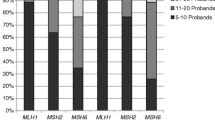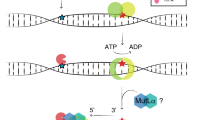Abstract
As genotyping for Lynch syndrome has become widespread, more and more people are being counseled about whether to be genotyped for mutations in mismatch repair genes. Recently a number of quantitative models have been developed to identify potential Lynch syndrome patients and serve as decision aids for patients at genetic counseling clinics. In contrast to existing clinical guidelines that give dichotomous classifications, these models provide a probability that a family or individual has Lynch syndrome. These models have been shown to be useful tools in identifying likely carriers of Lynch syndrome mutations. Correctly used, they have the potential to greatly improve the current diagnosis and management of Lynch syndrome families. To help clinicians and genetic counseling professionals understand the differences among these models and use the models wisely, we review the key features of each model and offer some guidelines on their use.
Similar content being viewed by others
References and Recommended Reading
Lynch HT, de la Chapelle A: Hereditary colorectal cancer. N Engl J Med 2003: 348:919–932.
Papadopoulos N, Nicolaides NC, Wei YF, et al.: Mutation of a mutL homolog in hereditary colon cancer. Science 1994, 263:1625–1629.
Leach FS, Nicolaides NC, Papadopoulos N, et al.: Mutations of a mutS homolog in hereditary nonpolyposis colorectal cancer. Cell 1993, 75:1215–1225.
Nicolaides NC, Papadopoulos N, Liu B, et al.: Mutations of two PMS homologues in hereditary nonpolyposis colon cancer. Nature 1994, 371:75–80.
Miyaki M, Konishi M, Tanaka K, et al.: Germline mutation of MSH6 as the cause of hereditary nonpolyposis colorectal cancer [letter]. Nat Genet 1997, 17:271–272.
Vasen HF, Mecklin JP, Khan PM, Lynch HT: The International Collaborative Group on Hereditary Non-Polyposis Colorectal Cancer. Dis Colon Rectum 1991, 34:424–425.
Vasen HF, Watson P, Mecklin JP, Lynch HT: New clinical criteria for hereditary nonpolyposis colorectal cancer (HNPCC, Lynch syndrome) proposed by the International Collaborative Group on HNPCC. Gastroenterology 1999, 116:1453–1456.
Lagerstedt Robinson K, Liu T, Vandrovcova J, et al.: Lynch syndrome (hereditary nonpolyposis colorectal cancer) diagnostics. J Natl Cancer Inst 2007, 99:291–299.
Jass JR: Hereditary non-polyposis colorectal cancer: the rise and fall of a confusing term. World J Gastroenterol 2006, 12:4943–4950.
Boland CR, Thibodeau SN, Hamilton SR, et al.: A National Cancer Institute Workshop on Microsatellite Instability for Cancer Detection and Familial Predisposition: development of international criteria for the determination of microsatellite instability in colorectal cancer. Cancer Research 1998, 58:5248–5257.
Umar A, Boland CR, Terdiman JP, et al.: Revised Bethesda Guidelines for hereditary nonpolyposis colorectal cancer (Lynch syndrome) and microsatellite instability. J Natl Cancer Inst 2004, 96:261–268.
Ramsey SD, Clarke L, Etzioni R, et al.: Cost-effectiveness of microsatellite instability screening as a method for detecting hereditary nonpolyposis colorectal cancer. Ann Intern Med 2001, 135:577–588.
Wijnen JT, Vasen HF, Khan PM, et al.: Clinical findings with implications for genetic testing in families with clustering of colorectal cancer. N Engl J Med 1998, 339:511–518.
Lipton LR, Johnson V, Cummings C, et al.: Refining the Amsterdam Criteria and Bethesda Guidelines: testing algorithms for the prediction of mismatch repair mutation status in the familial cancer clinic. J Clin Oncol 2004, 22:4934–4943.
Barnetson RA, Tenesa A, Farrington SM, et al.: Identification and survival of carriers of mutations in DNA mismatch-repair genes in colon cancer. N Engl J Med 2006, 354:2751–2763.
Balmaña J, Stockwell DH, Steyerberg EW, et al.: Prediction of MLH1 and MSH2 mutations in Lynch syndrome. JAMA 2006, 296:1469–1478.
Myriad Genetic Laboratories: Mutation prevalence tables. http://www.myriadtests.com/provider/mutprevhnpcc.htm. Accessed June 15, 2007.
Chen S, Wang W, Lee S, et al.: Prediction of germline mutations and cancer risk in the Lynch syndrome. JAMA 2006, 296:1479–1487.
Marroni F, Pastrello C, Benatti P, et al.: A genetic model for determining MSH2 and MLH1 carrier probabilities based on family history and tumor microsatellite instability. Clin Genet 2006, 69:254–262.
Jasperson KW, Lowstuter K, Weitzel JN: Assessing the predictive accuracy of hMLH1 and hMSH2 mutation probability models. J Genet Couns 2006, 15:339–347.
Bianchi F, Galizia E, Bracci R, et al.: Effectiveness of the CRCAPRO program in identifying patients suspected for HNPCC. Clin Genet 2007, 71:158–164.
Lynch HT, Lynch JF, Lynch PM: Toward a consensus in molecular diagnosis of hereditary nonpolyposis colorectal cancer (Lynch syndrome) [editorial]. J Natl Cancer Inst 2007, 99:261–263.
American Society of Clinical Oncology: American Society of Clinical Oncology policy statement update: genetic testing for cancer susceptibility. J Clin Oncol 2003, 21:2397–2406.
Author information
Authors and Affiliations
Corresponding author
Rights and permissions
About this article
Cite this article
Chen, S., Euhus, D.M. & Parmigiani, G. Quantitative models for predicting mutations in Lynch syndrome genes. Curr colorectal cancer rep 3, 206–211 (2007). https://doi.org/10.1007/s11888-007-0032-4
Published:
Issue Date:
DOI: https://doi.org/10.1007/s11888-007-0032-4




